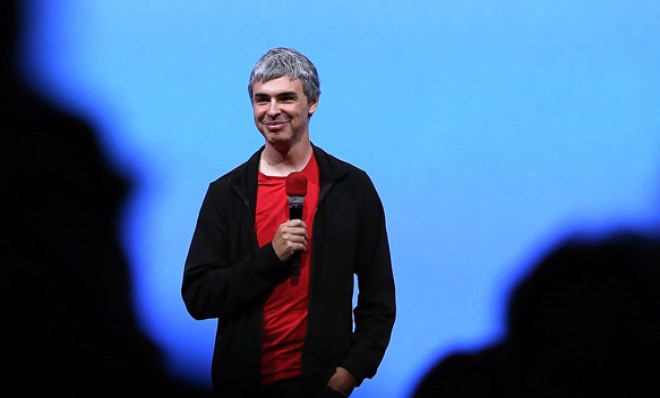Why tech critics are scoffing at Google's Larry Page
The CEO's plea for friendliness, originality, and positivity strikes many as more than a tad hypocritical

"Every story I read about Google is 'us versus some other company' or some stupid thing. We should be building great things that don't exist. Being negative isn't how we make progress."
That was Google CEO Larry Page at yesterday's Google I/O developer conference. The apparent call for unity was an odd punctuation mark at the end of a long day of announcing new products, considering Google's dogged reputation for copying and improving on the competition. After all, the company even unveiled a new music subscription service à la Spotify yesterday.
"Google is the company that built Android after the iPhone, Google Plus after Facebook," argues John Gruber at Daring Fireball. He continues:
The Week
Escape your echo chamber. Get the facts behind the news, plus analysis from multiple perspectives.

Sign up for The Week's Free Newsletters
From our morning news briefing to a weekly Good News Newsletter, get the best of The Week delivered directly to your inbox.
From our morning news briefing to a weekly Good News Newsletter, get the best of The Week delivered directly to your inbox.
Consider maps. Google Maps entered a market where MapQuest and others had been around for years. That wasn't something great that didn't already exist. It was a better version of something that already existed. Google is a hyper-competitive company, and they repeatedly enter markets that already exist and crush competitors. Nothing wrong with that. [Daring Fireball]
Clearly, Page is trying "to change the conversation whenever Google rips something off or crushes a market," says technology writer Marco Arment at his blog.
Politicians and executives do this all the time. "Arguing about [controversial thing we did], focusing too much on [our weakness], or implementing [regulation that benefits the public but makes us less profitable] isn't constructive and/or is holding back progress/jobs/children/America." [Marco.org]
Page's statements have given some of Google's competitors a bit of an opening, too. The same day that Page made his plea for friendliness, Google issued a takedown notice demanding Microsoft remove a YouTube app from Windows Phone, claiming it didn't support advertising. "We'd be more than happy to include advertising but need Google to provide us access to the necessary APIs," a Microsoft spokesperson told The Verge. "In light of Larry Page's comments today calling for more interoperability and less negativity, we look forward to solving this matter together for our mutual customers."
The upshot? "Google executives may consider themselves to be above the fray," says Verne Kopytoff at CNN Money, "but, in reality, they are as aggressive as many of their technology industry counterparts."
A free daily email with the biggest news stories of the day – and the best features from TheWeek.com
-
 World’s oldest rock art discovered in Indonesia
World’s oldest rock art discovered in IndonesiaUnder the Radar Ancient handprint on Sulawesi cave wall suggests complexity of thought, challenging long-held belief that human intelligence erupted in Europe
-
 Claude Code: the viral AI coding app making a splash in tech
Claude Code: the viral AI coding app making a splash in techThe Explainer Engineers and noncoders alike are helping the app go viral
-
 ‘Human trafficking isn’t something that happens “somewhere else”’
‘Human trafficking isn’t something that happens “somewhere else”’Instant Opinion Opinion, comment and editorials of the day